Merchant fleet as an element of the sea power of the state
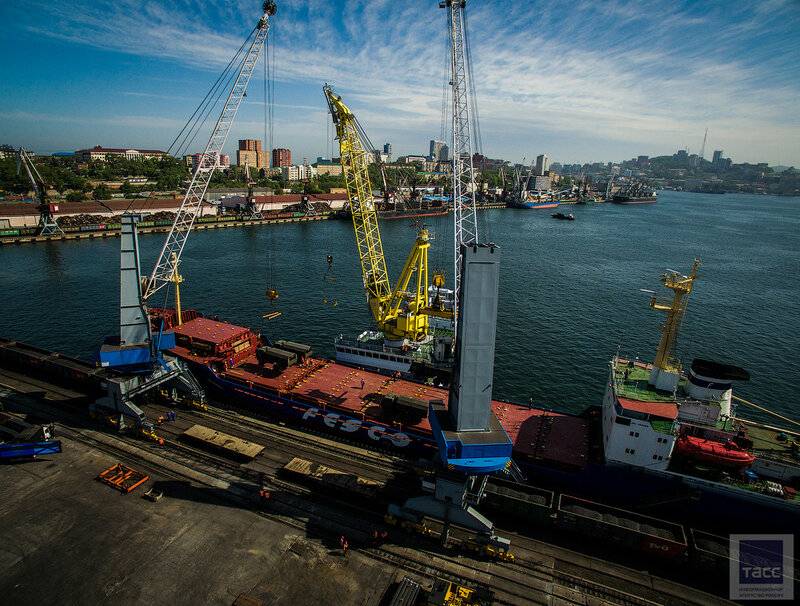
There is no military power without military transportation. Exercises on loading military equipment on board the FESCO (Far Eastern Shipping Company, FESCO) dry-cargo ship Captain Krems. Vladivostok, 2017. Photo: smitsmitty.livejournal.com
Alfred Mahan, in his work "The Influence of Sea Power on history 1660-1783", issued in 1889, defined sea power (Sea Power) as follows:
Domestic military historian captain 1st rank V.D. Dotsenko even came up with a symbolic formula for sea power, SP=N+MM+NB (Sea Power = Navy/Navy + merchant marine/Merchant marine + naval bases/Naval bases).
It would seem that the merchant fleet is one of the components of sea power, but this is not obvious. After all, you can build a strong navy, capture / rent naval bases abroad and control the sea at your discretion. What does the civilian fleet have to do with it? To provide bases and ships, not the largest fleet auxiliary ships subordinate to the Navy.
In the sailing era, the presence of a large merchant fleet guaranteed the number of sailors in the country. Accordingly, they could be called up to the navy if necessary. There were, of course, different fleet manning systems in those days. For example, in the Russian Empire, the navy was staffed with recruits, and no one was particularly interested in what the recruit did before the call and what it had to do with the sea.
But it is generally accepted that the most powerful navy at that time was the Royal Navy, which until the end of the Napoleonic Wars was equipped with the so-called. pressure, i.e., in preparing the fleet for the campaign, soldiers and marines combed the coastal cities and grabbed all the civilian sailors they came across (and not only, any tramp could fall under pressure), and escorted them to the ships. From which the sailors were not released until the end of the war, so as not to run away.
The system may look barbaric now, but it provided Britain with the strongest navy in the world at the time. And it is obvious that the presence of a large civilian fleet, which served as a training unit for the military, was critical for the British Empire.
But those days are over.
Since the middle of the XNUMXth century, quite different requirements have been imposed on civilian and military sailors, and their various structures are prepared according to different methods. Although still in some specialties, military and civilian sailors are interchangeable with minimal retraining. Therefore, the civilian fleet cannot be considered as a source of manpower for the military. For example, the US Navy has a reserve officer training system, and most of these reservists are non-civilian sailors.
Maybe the civilian fleet is needed as a source of ships that can be mobilized and converted into ships?
This is partly true, but only partly. Civilian ships can theoretically be converted into small patrol boats / corvettes / IPCs and minesweepers. Fishing vessels are suitable for these purposes (for example, the Project 503 STR was converted into a minesweeper during mobilization). But the fact of the matter is that fishing. And where is the place for the merchant, i.e. transport, fleet?
There is an idea to turn container ships into auxiliary cruisers by installing the Club-K container missile weapon system with Kh-35UE or Kalibr anti-ship missiles on them.
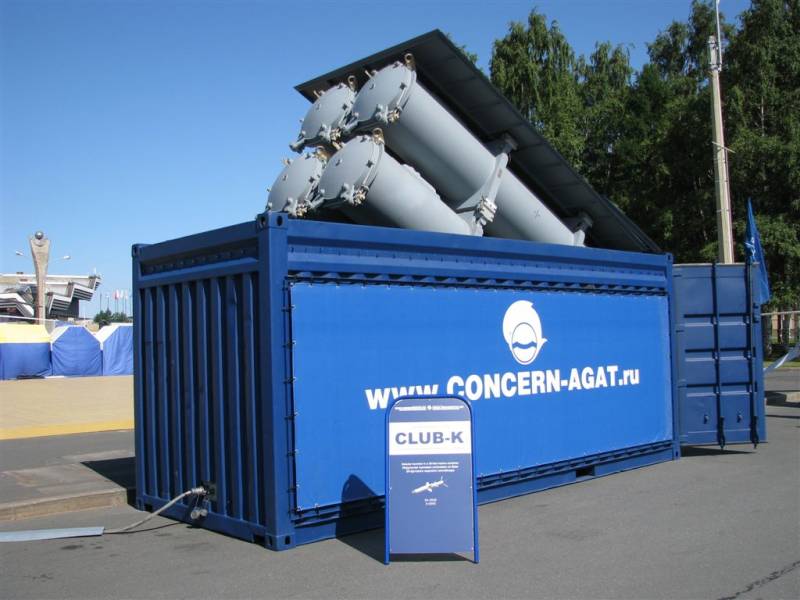
Export version of the Uranus missile weapon system with 3M24 anti-ship missiles (X-35 marine version) in a container (20-foot container) version. Auxiliary cruisers based on merchant ships can be armed with such launchers. Photo: Rocketry website (missilery.info)
But, firstly, the idea is controversial. She has no solid justification. Secondly, how many such cruisers are needed? No, not much. If the idea makes sense, they can all be kept in an auxiliary fleet or even mothballed.
It is possible, following the example of the Atlantic Conveyor, to turn a container ship into an ersatz aircraft carrier. But, again, the idea is controversial, and many courts are not required for its implementation. The whole complexity of such alterations and their ambiguous results can be found in the article by A. Timokhin Non-aircraft carriers and their aircraft. A little about the ersatz aircraft carriers of the 80s ".
The civil fleet can transfer part of the ships to serve the ships in the bases - bunkerers, small dry cargo ships, tugboats. But to provide ships at sea, specialized tankers are needed with offshore refueling systems and speeds higher than conventional tankers. It is better to keep such ships even in peacetime as part of the Navy, since their commercial operation is not profitable.
Conclusion No. 1. To serve as a source of human and material reserves for the Navy is a side, but not the main task of the civilian fleet. The main role of the civil fleet in the formation of sea power is transport.
A bit of history
1936–1939 Civil War in Spain. Supporting the Republicans, the USSR sent military aid by sea. A total of 51 vessel voyages were organized. The total tonnage of 50 steamships was 286 tons. Military equipment was delivered mainly by sea. Part of it went by rail from France, but it could only be delivered to France by sea.
1941–1945 The Great Patriotic War. During the war, 2 major evacuations of naval bases were carried out - Tallinn and Odessa; and one strategic landing operation - Kerch-Feodosiya. There were other fleet operations to transfer troops, and on the whole the use of transport ships was massive and of exceptional importance.
1962 Caribbean crisis. As part of Operation Anadyr, 50 personnel and up to 874 civilian personnel were deployed to Cuba; over 3 tons of material and technical means were transported. In July-October 000, 230 cargo and passenger ships took part in Operation Anadyr, which made 000 voyages to and from Cuba.
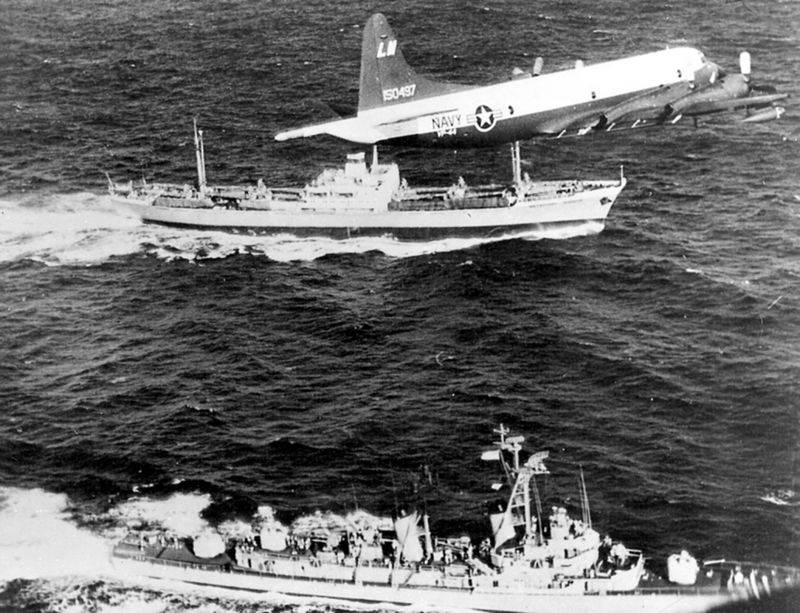
The Soviet merchant ship Metallurg Anosov is heading for Cuba. A US Navy destroyer is on a parallel course with an Orion aircraft flying over them. Caribbean Crisis, November 10, 1962. Photo: US Navy National Museum of Naval Aviation.
1964–1975 War in Vietnam. Due to political problems with China, military aid from the USSR was delivered to the DRV mainly by sea.
Now think about it, would the Soviet Union have been able to carry out these maritime transports without having a national merchant fleet? Foreign maritime carriers would begin to transport weapons from the Union, risking losing the ship in the port of unloading from sabotage or shelling, or falling under sanctions, or losing the ship after it was arrested at sea under a fictitious pretext with further confiscation. Only a national fleet under state control would do such a thing.
Conclusion No. 2 - Russia must recreate its national merchant fleet. It can be created in the form of a large state a shipping company subordinate to the Ministry of Transport, or in the form of a separate Ministry of the Navy. To whom nominally the fleet will be subordinated are the details. The main thing is that the ships sail under the Russian flag and, if necessary, go where they are needed.
Where are they needed?
1. Kaliningrad region. Since June 2022, Lithuania has been restricting land transit traffic with the Kaliningrad region. So far, it is limiting, but with the deepening of the Ukrainian crisis, it may stop altogether. Then the supply of the region will go only by sea. You can, of course, organize private carriers. But foreign shipowners will be afraid of sanctions, and national private shipowners will have enough tonnage to cover all the needs of the Kaliningrad region? A large state-owned company could find a reserve of tonnage, if necessary, break contracts for the transportation of goods from Russia in order to redirect it to Kaliningrad.
2. Republic of Crimea. Who can guarantee the existence of a land corridor to the Crimea and the serviceability of the Crimean bridge? Only the Department of Defense. Can the MO give a 100% guarantee? To be honest, no. There may well be a situation when the Crimea will be under blockade, and the supply will be possible only by sea. No transport aviation will not cope with the volume of transportation necessary for the Army and the civilian population.
3. Libya and Syria. I do not presume to argue whether it is worth supporting any side of the conflict in these countries, but since we have undertaken to supply weapons to someone, we must do it properly. Landing ships were used to organize the Syrian Express, which was many times more expensive than the use of conventional bulk carriers. Now there is Oboronlogistics LLC, which carries out transportation, including to Syria. We will talk about this company below.
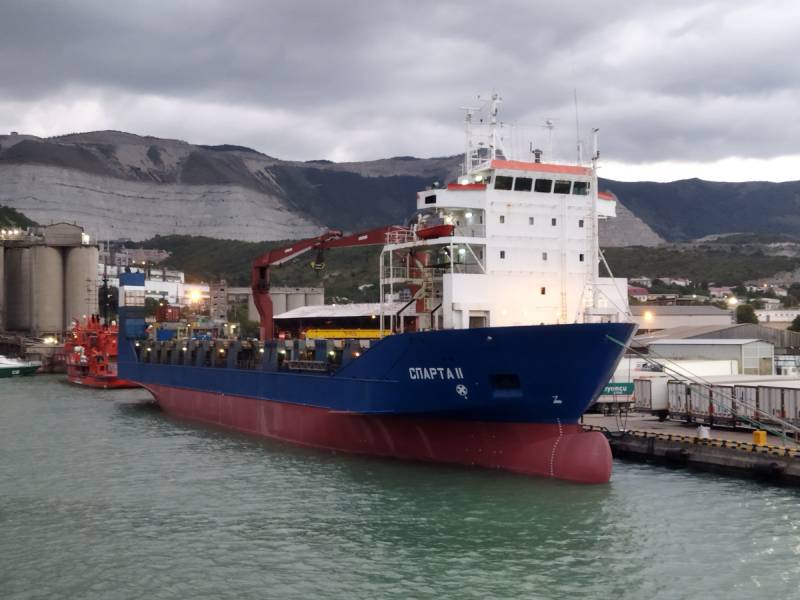
Vessel "Oboronlogistics" "Sparta II". Novorossiysk, 2021. One of those that are now supplying the Russian group in Syria, and not only it. Photo: fleetphoto.ru
4. EU embargo on the import of Russian crude oil by sea and a ban on European companies to insure and transport raw materials from Russia by tankers to third countries. The oil that Russia sent to Europe until 2022 is now being redirected to Asia. As a result, the supply chain is lengthening. There is already a lack of tonnage, and this may become a problem for oil exports from Russia. As you understand, this item can overlap the previous three. "Oil-mother" is still driving us. It may not be good, but it's true.
Conclusion number 3 - Russia has where to send the tonnage of the fleet. And send them to where the commercial structure does not want to work or is afraid.
What is already there?
1. Oboronlogistics LLC. The company's fleet consists of 9 dry-cargo vessels with a deadweight of up to 10 tons. You can't call such a big company. Oboronlogistics was created to meet the needs of the Ministry of Defense, however, in addition, it also fulfills civilian orders. For example, it provides the Ust-Luga-Baltiysk ferry line.
2. Sovcomflot. The company operates with a total deadweight of 11,67 million tons and specializes in the transportation of liquefied gas, oil and oil products. There are only two bulk carriers in the entire fleet of the company. For 2020, 82,8% of the company's shares belonged to the state. This is a very interesting state company - bоMost of the ships are registered under flags of convenience.
On May 13, 2022, PAO Sovcomflot completed the implementation of a number of measures aimed at restructuring the group's loan obligations, which contributed to the release of a significant part of the fleet from encumbrances. As a result of the actions taken, 14 vessels were sold. The number of the company's own fleet was reduced from 123 to 109 units, the share of the mortgaged vessels was reduced to 10%. The total composition of the fleet at the moment is 111 units. The group's total accounts payable decreased from $3 billion to $1,7 billion.
To put it simply, Sovcomflot sold part of its fleet after the start of the NWO in Ukraine. Realizing that the tonnage would not be superfluous for the country under the sanctions, the company's management sold the ships anyway. It is clear that SCF, as a commercial structure, acts in its own interests and worries, first of all, about its own survival. But the point is that State the company should prioritize the interests of the state, not its own.
3. PJSC "FESCO" (Far Eastern Shipping Company). The shipping company's fleet consists of 22 dry cargo ships. 8 of them with a total deadweight of 225 thousand tons sail under the flag of Cyprus, 14 vessels with a total deadweight of 132 thousand tons operate under the Russian flag.
“The court satisfied the claim of the prosecutor's office for the transfer of shares to the state,” the lawyer said.
According to the decision of the court, 92,4% of FESCO's shares were turned into state revenue.
That is, in fact, since 2023, FESCO has become a state-owned shipping company.
Historical experience
In 1856, the Russian Society of Shipping and Trade (ROPiT) was created on the Black Sea immediately after the Crimean War. To organize the society, the government allocated a loan for 20 years. It was also decided to pay the society from the treasury an annual allowance for the repair of steamships and an annual subsidy in the form of a pardon.
Before the newborn ROPiT, in addition to the development of merchant shipping, another task was tacitly set. The society was supposed to build merchant ships that, in the event of war, could perform combat missions, as well as create and maintain a base (crews, ports and repair facilities) necessary for the rapid reconstruction of the Black Sea Fleet (I recall, under the terms of the peace treaty concluded in 1856 , Russia could not have a military fleet on the Black Sea).
ROPiT steamships took part in the Russo-Turkish War of 1877–1878, the Russo-Japanese War of 1904–1905, the First World War. The activities of ROPiT ceased in 1918 after the nationalization of all property by the Soviet authorities.
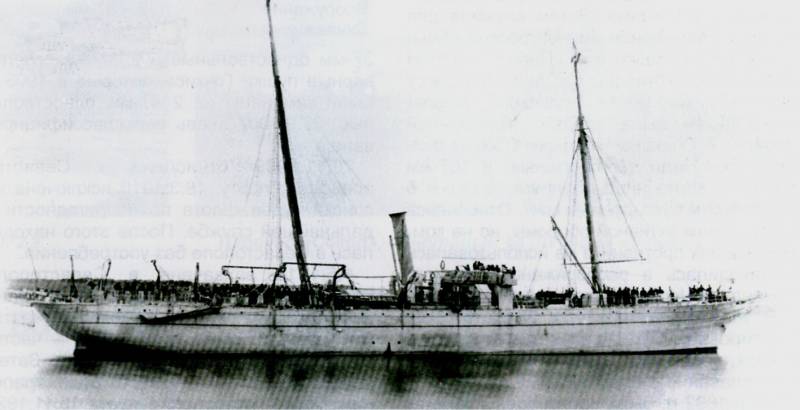
Auxiliary cruiser "Vesta". Before the start of the Russian-Turkish war of 1877–1878, the ROPiT steamship. Photo: Naval Campaign magazine. 2011, no. 1
In 1878, in view of the threatened war, the Volunteer Fleet (Dobroflot) was created. This transport enterprise was intended for the transportation of goods and passengers (the main direction of transportation is from the European part of Russia to the Far East), and also served as a source of ships for mobilization. The steamships of Dobroflot were to become a reserve of transport ships and auxiliary cruisers.
In 1883, fleet management was transferred to the Naval Ministry. The activities of Dobroflot were unprofitable, therefore, since 1885, the Volunteer Fleet has received an annual pardon subsidy from the state treasury. In 1925, Dobroflot was included in the Sovtorgflot.
Foreign experience
United States, Sealift Command, abbreviated MSC (Eng. Military Sealift Command, MSC). The command consists of auxiliary courts subordinate to the government and staffed by civilian personnel. In some cases, it is supplemented by military personnel from the Navy or other departments. At the head of the command is a vice admiral or rear admiral. It is subordinate to the ILC to the naval forces and performs the same functions as the auxiliary fleet of the Navy in Russia.
The main difference is that the transport capabilities of the ILC greatly exceed the capabilities of our auxiliary fleet. To assess these opportunities, I can say that during the Persian Gulf War of 1990-1991. The ILC transported 11 million tons of military cargo. Up to 230 state-owned and chartered vessels were involved in the transportation. As of 2018, the Command's fleet consisted of 54 transport ships, excluding special purpose ships and ships used to support warships.
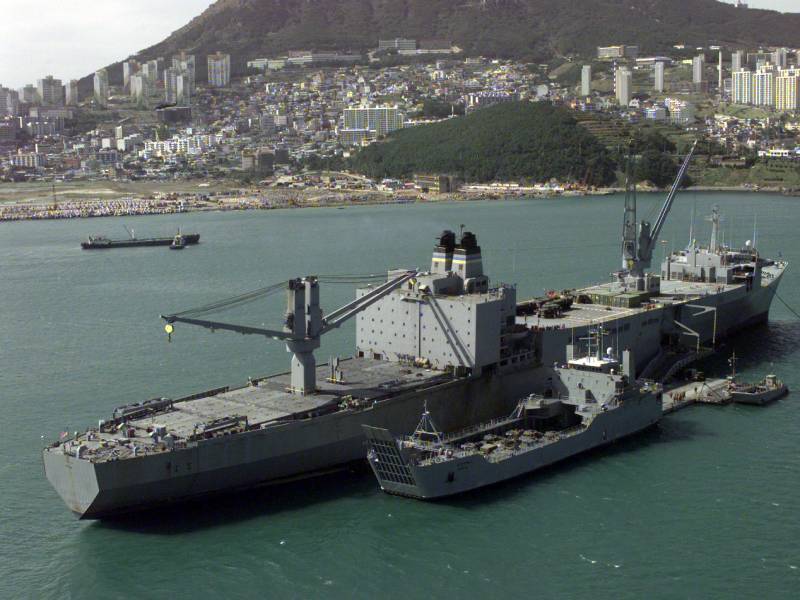
The KMP Pollux transport vessel is being unloaded at the anchorage. Busan, South Korea, 1998 Photo: US Department of Defense
The ILC is a powerful logistics operator under the control of the US Navy, providing America's global military presence. Without such an operator, maritime power is of limited value. The military fleet, which has seized dominance over sea communications and is not supported by the transport fleet, turns into a dog in the manger, i.e., it cannot provide its communications by sea.
In the US, such an operator is organized as a separate command, but it can also be organized as a state-owned shipping company. In this case, such a company will be able not only to provide military logistics, but also to solve economic problems.
What should be a state shipping company?
Russia needs a large shipping company with a fleet of ships for various purposes, i.e. dry cargo ships, tankers, and maybe special purpose ships.
At the level of the charter of the company, it must be determined that the company is credited by the state and primarily fulfills the state order for the transportation of export and coastal cargo or military equipment. In turn, the state guarantees the cargo base for the company. It is not difficult to implement this, there is still enough export in Russia. Also, at the level of the charter, a non-recurrence of the situation when a company sells its fleet during a threatened period should be provided.
What will we get from this?
1. Such a company will become a major player in the freight market, which will be able to influence the cost of freight.
2. In a large company, it will be easier to organize the accounting of ships and human resources for mobilization in case of war or during a threatened period. And now ships flying the Russian flag are registered with the military, but it is one thing to work with dozens of small shipowners, and another with one large one. In addition, it will be possible to form and monitor compliance with the requirements for the design of ships subject to mobilization - in small shipping companies this is an almost impossible task. The only obstacle here is the mess in the Ministry of Defense itself.
3. The state shipowner will be able to form an order for the construction and repair of ships in the USC. The quality of management at USC raises big questions. The cost of building and repairing ships in Russia is higher than, for example, in China. And if it is necessary to form a shipping company quickly, then it is better to purchase and repair ships in China. But theoretically (unfortunately, purely theoretically), if you have an order formation tool for the national industry, this is always good. Unfortunately, for this mechanism to work, a slightly different level of government is needed. Above what is now.
4. Consider this company not as a commercial enterprise that should make a profit. But as part of the infrastructure that ensures the functioning of the economy. Sanctions imposed against carriers of export cargo from Russia will not be terrible for us - Russia will have its own independent carrier.
5. The company will be planned-unprofitable. At best, it will work on self-sufficiency. There is nothing dramatic about this, international shipping is a business with a low profit margin of 2-4%. 6% is already a shipowner's dream.
6. In case of a very bad situation in the transportation market, the company will be able to decommission part of the fleet and put the ships into conservation, forming a reserve fleet. A similar procedure would be too burdensome for a small shipowner.
7. The company will be able to open shipping lines in areas where cargo traffic has not yet been formed, but could potentially grow over time. At first, carriers will suffer losses on this line, and it would be better if a state-owned company assumes these losses. The modern global market is disintegrating, and the opening of new lines is becoming an urgent task.
And once again about ship repair.
In general, ship repair is a misfortune for the Russian fleet. Warships in our country can be repaired for years, civil ships - for months. For comparison, the repair of a 15-year-old ship in China can be completed in about a month. Such terms of repair in Russia scare away shipowners. The shipping company cannot afford to take the ship out of service for a few extra months. Therefore, they prefer to be repaired in Turkey, South Korea, China, but not in Russia. There was such a situation in Soviet times.
The ship repair industry needs to be reformed, and the legal framework related to ship repair also needs to be reformed. But it is one thing to reform the industry with the injection of state money into it in the hope of an order that may not be received, and another thing is to inject money, knowing that they will pay off at the expense of the state order formed by the state shipping company. If the level of ship repair in Russia is increased, this will reduce the repair time. As a result, ships will spend less time in the SRZ and more time in the ranks.
The growth of domestic ship repair capabilities will also contribute to the growth of the Navy's might.
The total displacement of the Navy ships as of January 1, 2023 is approximately 0,8 million tons. The total tonnage of Sovcomflot is approximately 11,6 million tons, approximately the total displacement of the company's ships as empty ships is 1,5 million tons. Obviously, warships are more difficult to repair than ships, but one can roughly say that one large shipping company has twice as much hardware that needs to be repaired than the entire Russian Navy. Therefore, the order received from the civilian fleet has a stronger impact on the ship repair industry, and can help bring it to a level where it will not take years to repair a ship.
What problems will arise when creating a company?
1. Home is a low level of government. If another “effective manager” is put in charge of the company, then the losses from it will exceed the allowable rate, and the whole idea will be discredited. However, fleet management is still not the most creative activity. The procedures were worked out back in Soviet times. The main thing here is not to make gross mistakes and not to steal the budget beyond measure (I don’t believe that they won’t steal at all). In addition, the economies of scale of a large company will compensate for the flaws in public administration. Therefore, there is hope that even our officials will cope with this task.
2. Manning ship crews. Since Soviet times, Russia has inherited not the worst (though not ideal) system of maritime education. There are maritime personnel in the country, but the best of them go to work in foreign companies. It will be extremely difficult to lure people to work in a state-owned firm. It is obvious that the salary in it will not be the highest. Perhaps non-trivial measures are required. For example, for young people, 2 years of work in the civilian fleet can be introduced as an alternative to military service. Or guarantee a reservation against mobilization for company employees. In our difficult time, this can significantly help in the recruitment of crews.
Although there is a fairly high probability that due to sanctions pressure, foreign firms will refuse the services of Russian specialists. Then the sailors will have no choice but to go to work on ships under the Russian flag. A large shipping company in this case will look like a good alternative to small firms from the "Horns and Hooves" category.
3. Sanctions.
First, sanctions for the purchase of ships. The ideal solution is to build ships at our own shipyards. Theoretically it is possible, practically everything is difficult. Domestic shipbuilding has degraded to hull building. Yes, and in this we are already technologically behind. Filling the hull with ship equipment is a separate sore point. The share of imported equipment reaches 70%. However, production technologies are still there, albeit outdated in places. For example, Russia can still produce diesel engines for ships. Marine diesel engines are structurally simpler than ship engines, but production is limited by the lack of serial production and, accordingly, inadequate cost. In this case, it is a large state-owned company that will be able to form a large order that will ensure serial production. Due to serialization, it will be possible to pull up technologies.
Another option for circumventing sanctions, as mentioned above, is to purchase ships or elements of ship equipment in China. Although this is not a universal solution. Some Chinese companies are refusing to work with Russia because of the threat of sanctions.
Secondly, sanctions for the insurance of ships and cargo.
On June 10, 2022 Reuters reported about it with reference to sources.
It hasn't been a secret for a long time.
Problems with the insurance of ships, including tankers carrying Russian oil, arose after the imposition of Western sanctions.
Western companies withdrew insurance coverage from the sanctioned SCF.
On June 3, 2022, the EU imposed a partial embargo on Russian oil and banned EU companies from insuring its supplies to third countries.
Earlier, the Financial Times wrote that the EU agreed to introduce a similar ban on insurance with the UK, which accounts for about 90% of the tanker shipping insurance market.
Without waiting for the imposition of sanctions, at the end of April 2022, Russian insurance companies reached out for reinsurance at RNPK, a subsidiary of the Bank of Russia.
And when the Central Bank of the Russian Federation increased the guaranteed capital of the RNRC from 37 to 750 billion rubles, the transfer of contracts to the RNBC for reinsurance became massive.”
To put it simply, foreign companies refuse to insure Russian ships and cargoes as part of sanctions pressure. In response, the Bank of Russia increased the capital of RNPK so that it could provide state guarantees to Russian insurance companies that insure Russian tankers carrying oil. So the sanctions for insurance, if desired, can also be circumvented.
Is it possible to do without all this?
There is a black freight market that transports sanctioned goods. Without much advertising, everyone who needs it uses it, including some American companies. Theoretically, sanctioned goods from Russia can also be exported using the black market. But no one guarantees the stability of this market. In addition, no one guarantees the safety of ships operating on the black market.
Organizing another hotbed of piracy somewhere in Africa or Southeast Asia is not difficult. And surprisingly, the ships of NATO and EU countries may not notice piracy in a certain area. After all, a hybrid war can also be waged at sea. Piracy is a great tool for this. In such a situation, a state ship under the Russian flag will be protected not only by a detachment of marines or PMC fighters, but by the flag itself. And it is not known which protection will be more reliable.
Russia is waging a hybrid war in the context of the global crisis. And the crisis will not end soon. The global world economy is falling apart, economic protectionism is on the rise. It's not about whether it's good or bad - it's a fact, and we must adapt to it. A powerful national merchant fleet is an instrument of the economic war that Russia is forced to wage. It is needed not even for development, but for the survival of the country.
Information